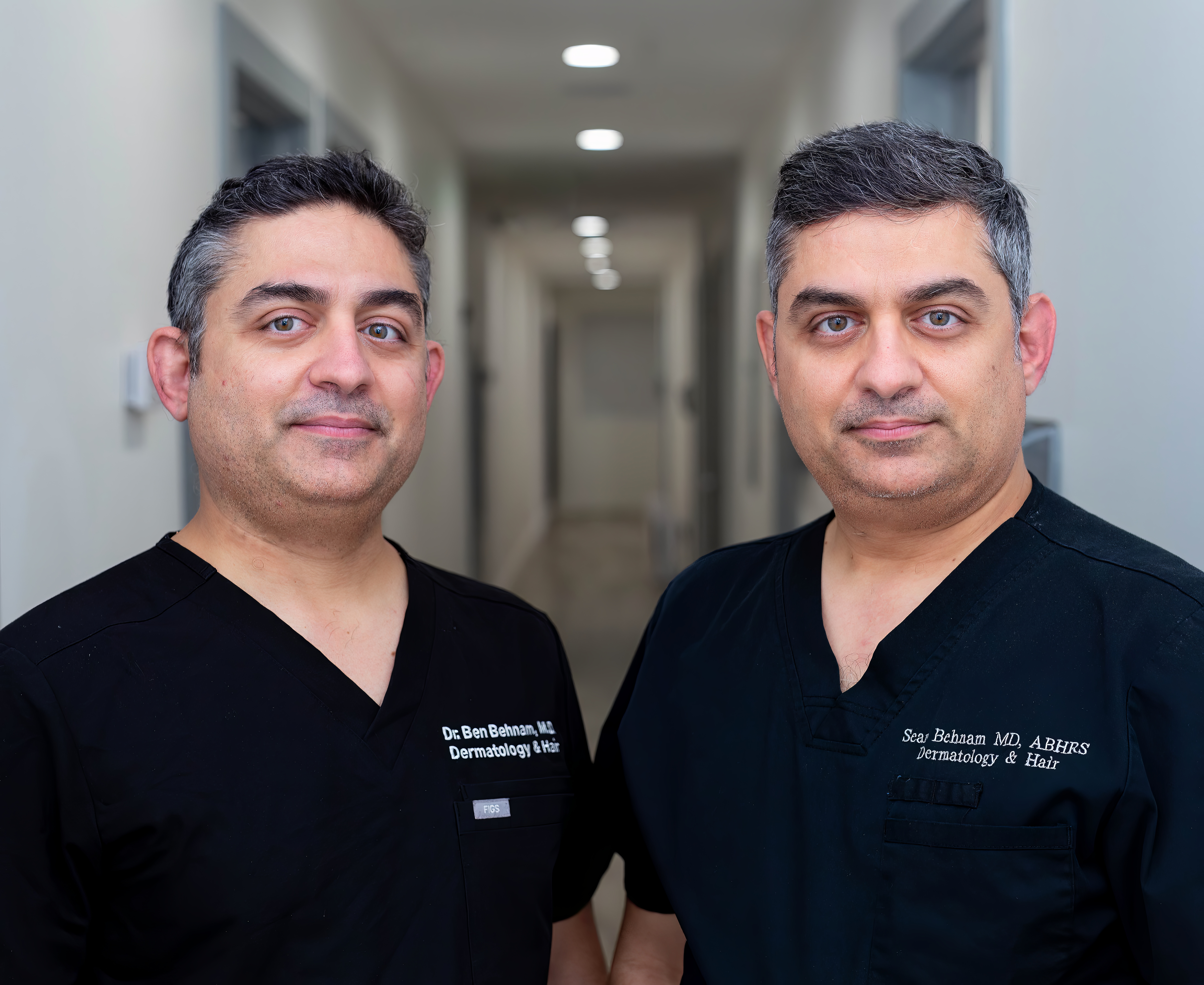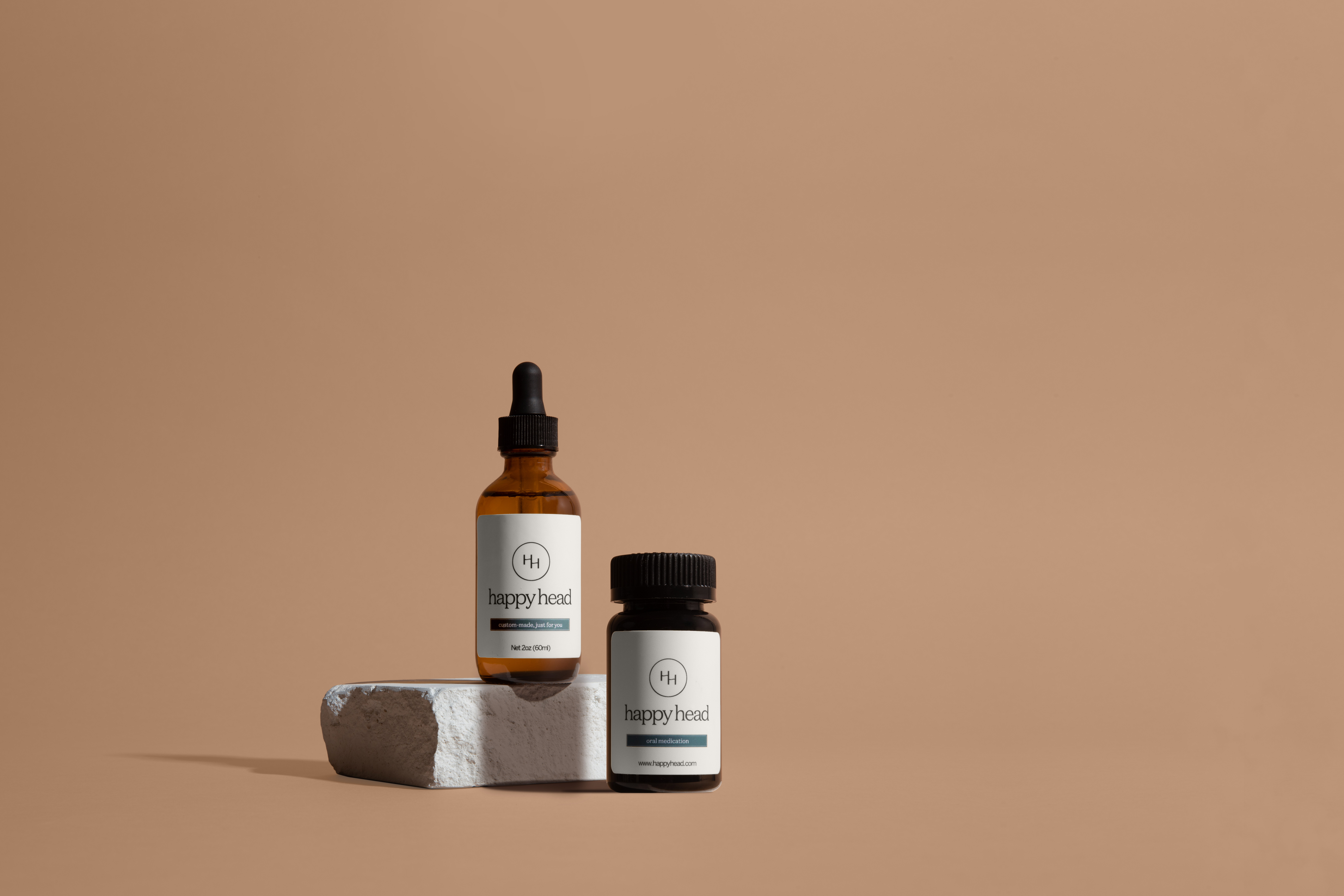Meet Happy Head Founders, Dr. Ben Behnam & Dr. Sean Behnam

Our founders, Dr. Ben Behnam and Dr. Sean Behnam are world-renowned twin doctors who’ve spent years studying medicine specializing in hair loss and restoration. Their shared experiences with alopecia and their love for patient care are where Happy Head gets its start. At Happy Head, we formulate hair growth solutions that work—plain and simple. Meet our founders and learn just how Happy Head became the leader in dermatologist-prescribed, customized hair medicine and treatments online. Head over to our questionnaire and get started on your hair growth journey today.
The Start: Twin Doctors’ Struggle With Alopecia Areata
Over a decade ago, the doctors each experienced sudden hair loss; the onset of hair loss was one week apart. To diagnose their hair loss, they knew that stress, vitamin imbalances, diet, or genetics could be the cause. As soon as they both started seeing hair loss, they knew it was inherited. Their shared DNA as identical twins revealed alopecia areata as the diagnosis. Alopecia areata is an autoimmune disease that attacks the hair follicles which become inflamed, causing the hair to shrink or miniaturize and ultimately fall out.
As doctors, their combined studies specialized in skin and hair gave them access to specific treatment options that most would struggle to find. On one hand, there were medications that caused them to experience a degree of side effects, sexual side effects as is most common in men, and on the other were sometimes painful cortisone injections. At the time, the available topical solutions for hair growth only included one or two ingredients and were ineffective or were all one-size-fits-all. Plus, getting a prescription and a proper diagnosis takes time. Most are unaware that dermatologists are the physicians who spend additional time studying skin and hair conditions during residency and are the most equipped to diagnose and treat hair loss. As specialists they had help, but it occurred to the doctors that not everyone has access to solutions that work.

Formulating Hair Growth Solutions That Work
“There’s a lot of snake oil out there, which causes patients to spend money and waste precious time trying to figure out what can work for them. During the Pandemic, we started to formulate solutions for our patients that weren’t available anywhere else. We would create new, custom formulas for each patient in our practice. We also knew that there were millions of people who were struggling with hair loss and needed stronger ingredients and the right combinations to get them results. That’s when Happy Head was born.” – Dr. Sean Behnam.
Together they formulated a series of proprietary medications both oral and topical options for men. Shortly after the company expanded in 2021 and continued to formulate new hair growth solutions for women. Today, Happy Head is leading the charge with the strongest medications available made with FDA-approved ingredients including a one of kind 3-in-1 SuperCapsule and liposomal formula unavailable anywhere else. We’re the only online telemedicine company that creates effective, clinically proven prescription hair loss medications formulated by dermatologists and hair experts.
“The best thing about working with my brother has been the collaboration. We founded Happy Head to do for our patients what we had trouble finding ourselves. Having two heads is better than one, so we thrive off of our shared expertise. Everyone who needs hair growth solutions should have effective options that are easy to use. ” – Dr. Ben Behnam
At Happy Head, we’re always learning and adapting to the latest technology and ingredients. Our physicians are all working doctors, so they’re always trying new methods of hair growth. That’s why our groundbreaking formulas lead the way.
The Founders’ Medical Education & Awards
At the forefront of our amazing team, board-certified dermatologist Dr. Ben Behnam and board-certified hair transplant surgeon Dr. Sean Behnam are known all over the world for their research and developments. They’ve each focused their work on different aspects of hair loss, bringing with them a unique perspective as they lay the foundation for online hair growth treatments in addition to their growing practice. Their dermatology and hair restoration practice is located in Santa Monica, CA.
Dr. Ben Behnam’s Education & Awards
As a sufferer of hair loss and eczema, and a physician, Dr. Ben Behnam is know for his close attention to patient needs. Hair loss is a stressful condition when you’re not sure why you’re losing hair and the fear that comes with talking about it. For many people hair loss happens gradually which can be frustrating, especially since the longer you wait the more hair you lose. Dr. Ben understands what his patients need and how to help them break the taboo around the conversation of hair loss, but also how to connect on a personal level.
Dr. Ben specializes in topical finasteride, stem cell and PRP for hair growth, acne scarring which include TCA CROSS techniques, subscision, CO2 and radiofrequency laser treatments, microneedling, and general cosmetic dermatology. Here are a few of his accomplishments:
- Graduated Summa Cum Laude from UCLA
- UC Irvine School of Medicine (graduated top of his class with an AOA distinction)
- Dermatology training under the renowned prominent cosmetic and Mohs surgeon Dr. Christopher Zachary at UC Irvine School of Medicine
- The distinction of being the Chief Resident in his senior year
- During residency, Dr. Ben Behnam was among few in the country to be awarded the Skin Disease Education Foundation Resident Award
- Involved in clinical trials and is widely published in journals such as the Journal of American Academy of Dermatology, Journal of Drugs in Dermatology, Cutis, Expert Opinion in Pharmacotherapy, among others
Dr. Sean Behnam’s Education & Awards
Known for his excellent bedside manner and standard of patient care, Dr. Sean spends his days ideating new treatments and performing hair transplant surgery focused on one patient a day. Dr. Sean is known around the world for his accomplishments with FUT and FUE designs and techniques. He has manufactured and custom-designed many of the instruments and equipment used in the procedures he performs each day. He is also an elite member of the International Alliance of Hair Restoration Surgeons (IAHRS), the only nationally recognized society for hair restoration. Here are just a few of his accomplishments:
- Undergraduate Education at the University of California Los Angeles (UCLA)
- Medical School at Oregon Health Sciences University (OHSU)
- Residency at the University of California, San Francisco (UCSF-Fresno)
- Hair Transplant Training for Distefano Hair Restoration Centers
- 2023 Named One of the Top Hair Transplant Surgeons in the World
- 2016 and 2018 Top 1% of America’s Most Honored Professionals
- 2016 and 2017 On-Time Physician Award
- 2011-17 Compassionate Doctor Award
- 2011-17 Patients’ Choice Award
- Vitals Top 10 Doctors by State
- Top 10 Internists
Now that you’ve met our founders and understand why we created Happy Head, don’t wait to treat your hair loss. Take our online questionnaire here, send us a photo of your hair, and get custom hair growth medications made fresh for you. And don’t miss the doctors on our IG @hihappyhead and on our YouTube channel.




